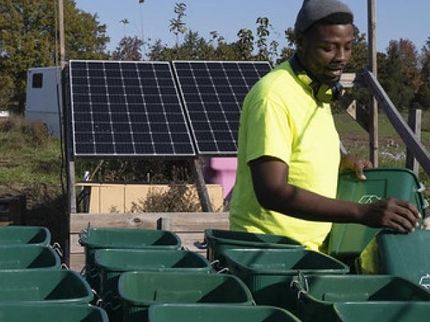How we all eat today
Research published today by the Food Standards Agency indicates that the top three food-related concerns are food waste, the amount of sugar in food, and animal welfare
Food and You 2, the FSA’s flagship consumer survey, also shows that two in five of us say we’ve eaten less processed food in the past year, and are trying to cut down on food waste.

Photo by Brooke Lark on Unsplash
The survey is an official statistic and measures self-reported knowledge, attitudes and behaviours related to food safety and other food issues amongst adults in England, Wales, and Northern Ireland twice a year.
This latest survey was conducted between October 2021 and January 2022 and provides rich and high quality data on what people think, feel and do when it comes to food.
Emily Miles, Chief Executive at the FSA, said:
‘As well as giving us an important insight into the FSA’s core responsibility of food safety, Food and You 2 also provides us with a detailed snapshot of peoples’ perceptions and behaviours on food-related issues, including sustainability, food security, and their diets.
‘The FSA’s new strategy committed it to helping the governments we serve in Westminster, Wales and Northern Ireland to ensure food is healthier and more sustainable, as well as being safe and what it says it is. This insight is part of the evidence we provide so that consumers’ perspectives on the food they eat are heard.’
Key findings
Confidence in food safety, authenticity and the food supply chain
-
Most respondents (92%) reported that they were confident that the food they buy is safe to eat and more than 8 in 10 (86%) respondents were confident that the information on food labels is accurate
Around three quarters of respondents (76%) reported that they had confidence in the food supply chain
Respondents were more likely to report confidence in farmers (88%) and shops and supermarkets (85%) than in takeaways (61%), and food delivery services (45%)
Concerns about food
-
Most respondents (86%) had no concerns about the food they eat
When prompted, the most common concerns amongst all respondents were food waste (63%), the amount of sugar in food (59%) and animal welfare (56%)
Food security
-
Across England, Wales, and Northern Ireland, 82% of respondents were classified as food secure (70% high, 12% marginal) and 18% of respondents were classified as food insecure (10% low, 7% very low)
Eating out and takeaways
-
Around half of respondents had eaten food in a restaurant (53%), from a café, coffee shop or sandwich shop (either to eat in or to take out) (52%) or ordered a takeaway directly from a takeaway shop or restaurant (50%) in the previous 4 weeks
Over a third of respondents had eaten food from a fast-food outlet (either to eat in or take out) (38%) or ordered a takeaway from an online food delivery company (for example, Just Eat, Deliveroo, Uber Eats) (35%) in the previous 4 weeks
Most respondents (89%) had heard of the FHRS and around 4 in 10 (41%) respondents reported checking the food hygiene rating of a business in the previous 12 months
Food allergies, intolerances and other hypersensitivities
-
Just over 1 in 10 (12%) respondents reported that they had a food intolerance, 4% reported having a food allergy, and 1% reported having coeliac disease
Of the respondents who reported having a food allergy, the most common foods reported as causing a reaction were peanuts (26%) and fruit (24%)
Of the respondents who reported having a food intolerance, the most common foods reported as causing a reaction were cow’s milk and products made with cow’s milk (41%) and cereals containing gluten (19%)
Eating at home
-
Over two thirds (69%) of respondents identified the use-by date as the information which shows that food is no longer safe to eat
Around two-thirds (67%) of respondents reported that they always check use-by dates before they cook or prepare food
Over half of respondents (56%) reported that they never wash raw chicken, whilst 40% of respondents wash raw chicken at least occasionally
Food shopping: sustainability and environmental impact
-
Half (50%) of respondents thought that eating less processed food and 47% thought that minimising food waste contributed most to someone having a sustainable diet
Most (59%) respondents thought that buying locally produced food or food that is in season contributed most to someone making sustainable food shopping choices
Sustainable diets, meat alternatives and genetic technologies
-
The most common changes respondents reported making in the previous 12 months were eating less processed food (40%) and starting to minimise food waste (40%)
Around a third (32%) of respondents reported that they currently eat meat alternatives, 21% of respondents reported that they used to eat meat alternatives but no longer do and 39% of respondents reported that they had never eaten meat alternatives
Respondents reported greater awareness and knowledge of genetically modified (GM) food (9% had never heard of GM food) than gene-edited or genome-edited food (GE) (42% had never heard of GE food)
Awareness, trust and confidence in the FSA
-
Around three quarters (77%) of respondents who had at least some knowledge of the FSA reported that they trusted the FSA to make sure ‘food is safe and what it says it is’
About the report
Fieldwork for Food and You 2: Wave 4 was conducted between 18 October 2021 and 10 January 2022. A total of 5,796 adults from 4,026 households across England, Wales, and Northern Ireland took part.
Other news from the department business & finance
Most read news
More news from our other portals
See the theme worlds for related content
Topic world Food safety
Food safety is at the heart of the food and beverage industry. It ensures that the food we eat every day is not only nutritious, but also free of harmful contaminants. From field to plate, the industry monitors and regulates every step of the process with strict quality controls, advanced testing methods and continuous research.

Topic world Food safety
Food safety is at the heart of the food and beverage industry. It ensures that the food we eat every day is not only nutritious, but also free of harmful contaminants. From field to plate, the industry monitors and regulates every step of the process with strict quality controls, advanced testing methods and continuous research.































































